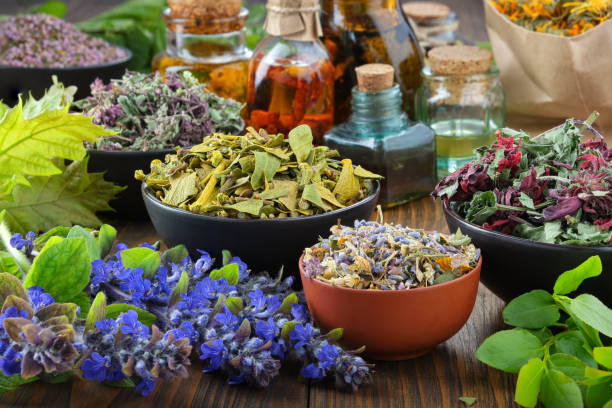Exploring the Therapeutic Potential of Adaptogens in Modern Stress Management
The relentless pace of modern life has thrust stress management into the spotlight of health and wellness. As we grapple with unprecedented levels of anxiety and burnout, an ancient class of herbs known as adaptogens is gaining renewed attention. But what exactly are these botanical wonders, and could they hold the key to unlocking a more balanced, resilient you?

The concept of adaptogens draws inspiration from the plant kingdom’s remarkable ability to thrive in harsh environments. These resilient botanicals have evolved complex biochemical strategies to withstand extreme conditions, from scorching deserts to frigid tundras. Scientists theorized that by consuming these plants, humans might be able to harness some of their stress-resistant properties.
Understanding the Science Behind Adaptogens
At their core, adaptogens work by modulating the body’s stress response system, known as the hypothalamic-pituitary-adrenal (HPA) axis. This intricate network of glands and hormones plays a crucial role in how we react to stressors, both physical and psychological. When faced with a threat, real or perceived, the HPA axis triggers the release of cortisol, often called the stress hormone.
While this response is essential for survival, chronic activation of the stress response can lead to a host of health issues, including fatigue, anxiety, and weakened immunity. Adaptogens act as a buffer, helping to normalize the body’s stress response and promote homeostasis. Research suggests that these herbs can influence the production and activity of stress hormones, neurotransmitters, and other biochemical mediators involved in the stress response.
The Diverse World of Adaptogenic Herbs
The adaptogen family encompasses a wide variety of plants, each with its unique profile of bioactive compounds and potential benefits. Some of the most well-studied adaptogens include:
-
Rhodiola rosea: Known for its potential to combat fatigue and enhance cognitive function.
-
Ashwagandha: Prized in Ayurvedic medicine for its ability to promote calm and support overall well-being.
-
Eleuthero: Often used to boost energy levels and support immune function.
-
Schisandra: Valued for its potential to improve focus and physical performance.
-
Holy Basil: Revered in India as a sacred plant with stress-relieving properties.
While these herbs share the common trait of supporting stress adaptation, each has its unique mechanisms of action and potential applications. This diversity allows for personalized approaches to stress management, tailored to individual needs and health goals.
The Promise and Challenges of Adaptogen Research
The growing interest in adaptogens has sparked a surge in scientific research, with numerous studies exploring their potential benefits. Early findings suggest that these herbs may offer a range of health-promoting effects, from enhancing cognitive function and mood to supporting immune health and athletic performance.
However, the field of adaptogen research is not without its challenges. Many studies have been small in scale or limited in duration, and more robust clinical trials are needed to fully elucidate the long-term effects and optimal usage of these herbs. Additionally, the complex nature of herbal medicine presents unique challenges in terms of standardization and quality control.
Despite these hurdles, the potential of adaptogens to offer a natural, holistic approach to stress management continues to captivate researchers and health enthusiasts alike. As our understanding of these remarkable plants grows, so too does the possibility of harnessing their power to support resilience and well-being in an increasingly stressful world.
Integrating Adaptogens into a Holistic Wellness Approach
While adaptogens offer exciting potential in the realm of stress management, it’s important to view them as part of a comprehensive approach to health and wellness. These herbs are not magic bullets, but rather tools that can complement other lifestyle practices such as regular exercise, balanced nutrition, and mindfulness techniques.
When considering the use of adaptogens, it’s crucial to consult with a healthcare professional, particularly for individuals with pre-existing health conditions or those taking medications. Like any bioactive substance, adaptogens can interact with other herbs, supplements, or pharmaceuticals, and may not be suitable for everyone.
The Future of Adaptogenic Research and Application
As we look to the future, the field of adaptogen research holds immense promise. Advances in genomics and personalized medicine may allow for more targeted use of these herbs, tailoring recommendations based on individual genetic profiles and health needs. Furthermore, ongoing research into the molecular mechanisms of adaptogens could lead to the development of new, more potent stress-management strategies.
In an era marked by unprecedented levels of stress and anxiety, the exploration of natural, holistic approaches to resilience and well-being has never been more critical. Adaptogens, with their rich historical legacy and growing scientific backing, offer a fascinating avenue for those seeking to navigate the challenges of modern life with greater ease and vitality.
Adaptogen Wisdom: Key Insights and Practical Tips
-
Start low and go slow: Begin with small doses of adaptogens and gradually increase as needed.
-
Consistency is key: Many adaptogens work best when taken regularly over time.
-
Quality matters: Choose high-quality, standardized adaptogen products from reputable sources.
-
Rotate your adaptogens: Some practitioners recommend cycling different herbs to prevent tolerance.
-
Timing is important: Some adaptogens are energizing and best taken in the morning, while others may support relaxation and sleep when taken in the evening.
-
Synergy in blends: Certain adaptogenic herbs may work synergistically when combined, potentially enhancing their overall effects.
-
Listen to your body: Pay attention to how you feel when taking adaptogens and adjust accordingly.
-
Remember, adaptogens support resilience: They work best in conjunction with a healthy lifestyle, not as a substitute for good self-care practices.
In conclusion, the world of adaptogens offers a fascinating glimpse into the intricate relationship between plants and human health. As we continue to unravel the mysteries of these remarkable herbs, they stand as a testament to the enduring wisdom of traditional healing practices and the exciting frontiers of modern scientific inquiry. By approaching adaptogens with both curiosity and caution, we may unlock new pathways to resilience, vitality, and holistic well-being in our stress-laden world.






